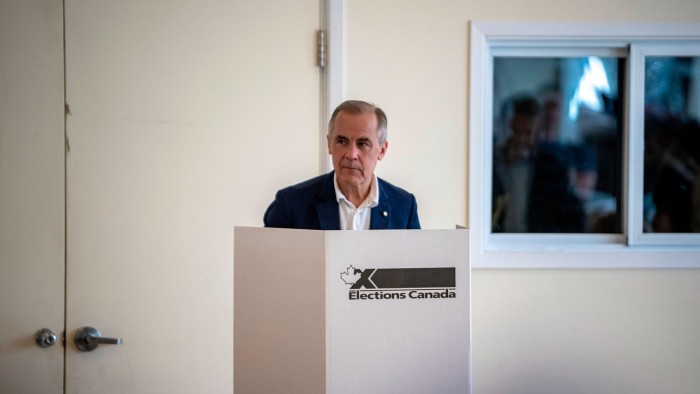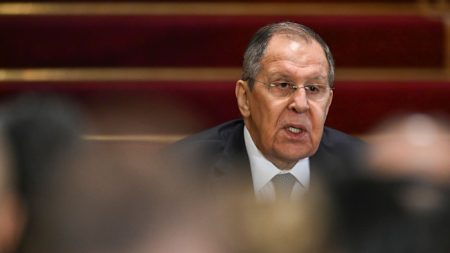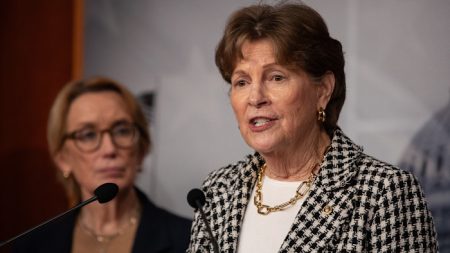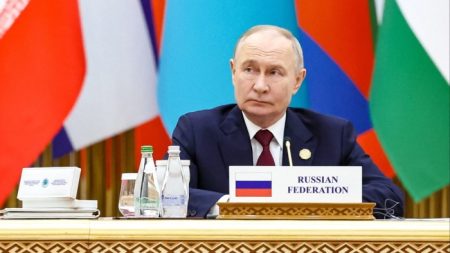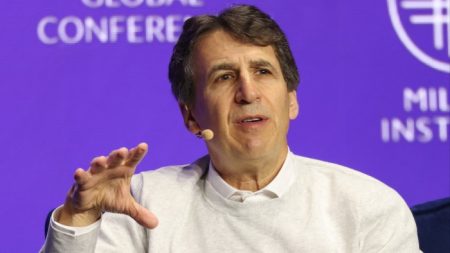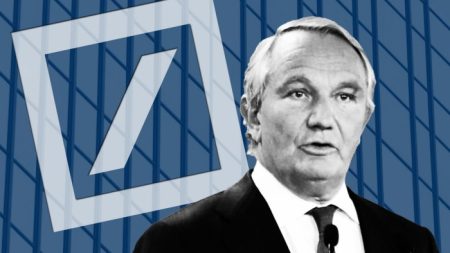Unlock the Editor’s Digest for free
Roula Khalaf, Editor of the FT, selects her favourite stories in this weekly newsletter.
Counting has begun in Canada’s national election after US President Donald Trump earlier in the day urged voters to elect a leader who would make the country the US’s 51st state as “it was meant to be”.
The Liberal party led by Mark Carney had secured 16 seats in eastern Canada as polls began to close, versus five for the Conservatives, according to projections from the Canadian Broadcasting Corporation. However, the Conservatives made some unexpected gains in a region that traditionally favours the Liberals.
The bulk of the national results are expected later in the night.
Trump’s comments on Monday morning followed a campaign that has been shaped by his attacks on the country’s sovereignty and his threats to hammer the US trading partner with tariffs.
“America can no longer subsidise Canada with the Hundreds of Billions of Dollars a year that we have been spending in the past,” Trump posted on Truth Social.
The president did not say whom he wanted to win Canada’s election, but his comment will be welcomed by Carney’s Liberal party, which has made Canadian sovereignty and opposition to Trump core themes of its pitch to voters.
One Carney adviser described Trump’s post on Truth Social, his social media platform, as a “gift”.
“The crisis in the United States doesn’t stop at their borders,” Carney said in a final election message. “But this is Canada — and we decide what happens here.”
The vote on Monday has been billed in Canada as a pivotal choice in the face of Trump’s taunts — and will be watched across the west for signs that a foreign leader who has been vocal in opposing Trump can succeed electorally.
The question of leadership, rather than party choice or domestic politics, has dominated the contest between Prime Minister Mark Carney and the Conservative leader Pierre Poilievre, two men offering very different paths for Canada.
“President Trump, stay out of our election,” Poilievre posted on X on Monday morning. “We will NEVER be the 51st state.”
While Carney has drawn on his record as a central banker as he focuses on the economic uncertainty created by Trump’s tariff, Poilievre has concentrated on housing prices, crime and the cost of living.

“My question to Canadians is simple: Is Pierre Poilievre the person you want sitting across the table from Donald Trump?” Carney said at a rally on Saturday in King City, Ontario.
Poilievre has promoted a “common sense” agenda by tying Carney to the previous Liberal prime minister Justin Trudeau, who led Canada for nine years before resigning in January.
“We cannot afford a fourth Liberal term. We need a change,” Poilievre said at a rally in British Columbia on Saturday.
Trump’s aggressive comments on Canada and his tariffs imposed on one of the US’s closest commercial partners have brought a wave of patriotism across the country and transformed the race.
A once certain Conservative victory under Poilievre has shifted to an “unpredictable contest”, with Carney’s Liberals gaining significant momentum in recent months, according to David Coletto, chief executive of Abacus polling.

“Initially centred around affordability and a widespread desire for change, this campaign has evolved dramatically into a referendum on stability amid global uncertainty,” Coletto said.
Poilievre’s perceived likeness to Trump has been a liability as many voters are wary of “Maga-style” policies influencing Canada.
The final push by both sides was derailed by the death of 11 people in Vancouver, on Canada’s west coast, on Saturday night, after a man drove his car into a Filipino street festival. Police have ruled out terrorism. Carney temporarily suspended his campaign and headed to Vancouver for a meeting with the Filipino community.
The significance of this election, amplified by the stark contrast in leaders and the remarkable surge in the Liberal party’s popularity, is expected to result in high voter turnout.
Elections Canada, the government agency that oversees the vote, reported that a record 7.3mn Canadians had already voted, a 25 per cent increase from the previous election in 2021.
This leaves another 21mn registered voters to cast a ballot on Monday.
At the centre of the contest is a battle for marginal seats needed to secure the 172 ridings required to form a majority government.
Both the 338Canada project and the CBC’s poll tracker, an aggregate of opinion polls, show the Liberals comfortably winning.
Read the full article here


